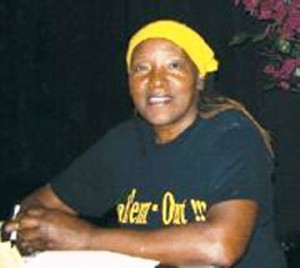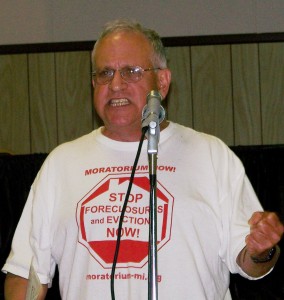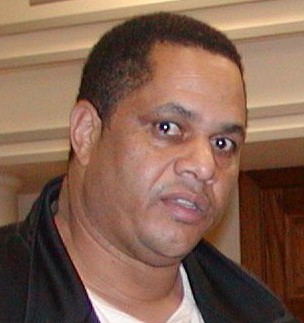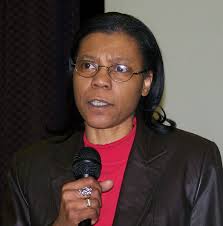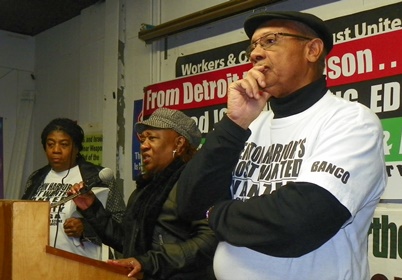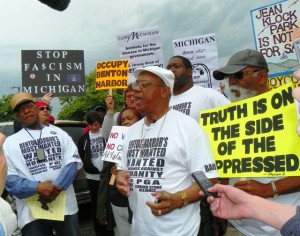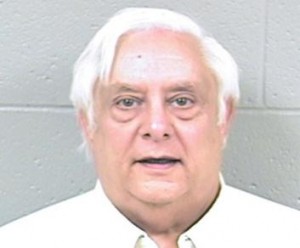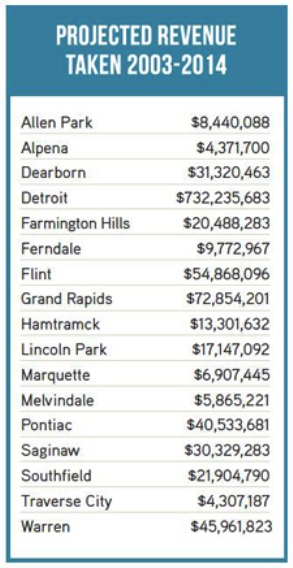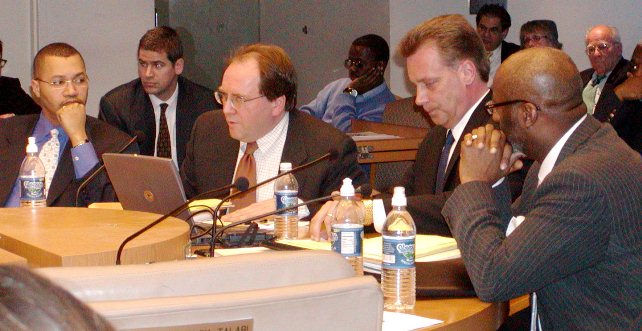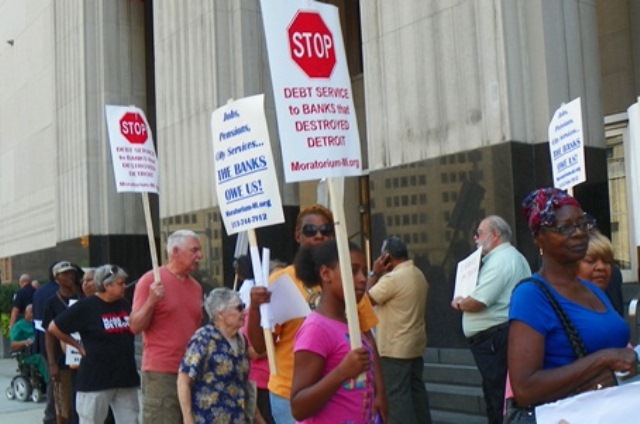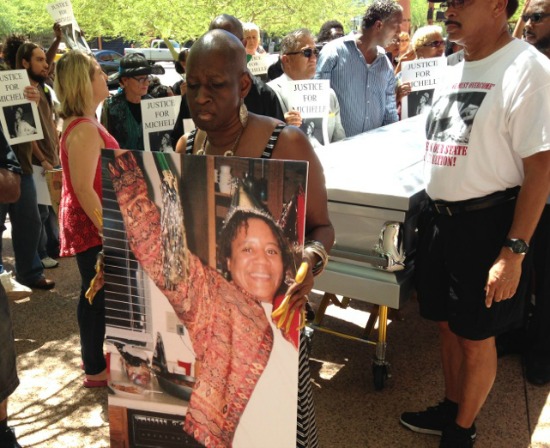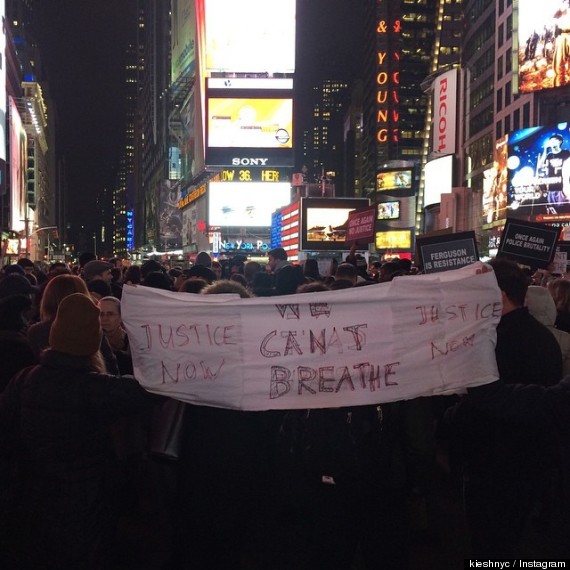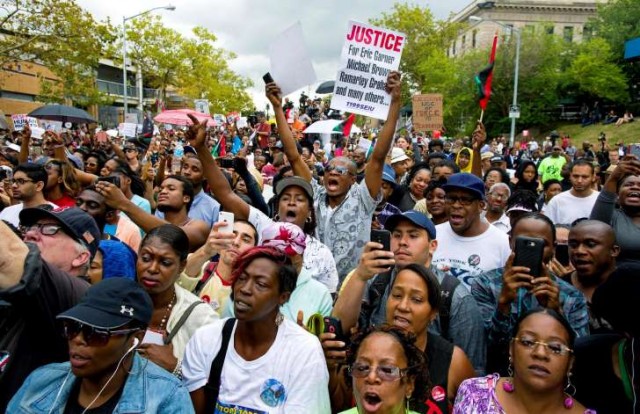
U.S. Pres. Barack Obama and Cuban President Raul Castro shook hands at Dec. 2013 memorial for Nelson Mandela. Brazililan President Dima Roussef watched.
Cuban Five are free; travel, trade and third country restrictions eased; U.S. to review Cuba’s designation as a State Sponsor of Terrorism
White House statement stresses expansion of private sector, Cuba “human rights” issues, despite UN condemnation of US police, prison terror
White House wants expansion of internet facilities in Cuba
Issue of political refugee Assata Shakur not addressed
HAVANA, Cuba
December 17, 2014

Fidel and Raul Castro; Fidel retired in 2008 due to health reasons and his brother assumed his duties.
STATEMENT BY CUBAN PRESIDENT RAUL CASTRO ,
Fellow countrymen:
Since my election as President of the State Council and Council of Ministers I have reiterated in many occasions our willingness to hold a respectful dialogue with the United States on the basis of sovereign equality, in order to deal reciprocally with a wide variety of topics without detriment to the national Independence and self-determination of our people. This stance was conveyed to the US Government both publicly and privately by Comrade Fidel on several occasions during our long standing struggle, stating the willingness to discuss and solve our differences without renouncing any of our principles.
The heroic Cuban people, in the wake of serious dangers, aggressions, adversities and sacrifices has proven to be faithful and will continue to be faithful to our ideals of independence and social justice. Strongly united throughout these 56 years of Revolution, we have kept our unswerving loyalty to those who died in defense of our principles since the beginning of our independence wars in 1868.

Cuban children in 1991 as workers, on paid leave from their regular jobs, were building their own new apartments at La Guinera. Photo: Diane Bukowski
Today, despite the difficulties, we have embarked on the task of updating our economic model in order to build a prosperous and sustainable Socialism. As a result of a dialogue at the highest level, which included a phone conversation I had yesterday with President Obama, we have been able to make headway in the solution of some topics of mutual interest for both nations.
As Fidel promised on June 2001, when he said: “They shall return!” Gerardo, Ramon, and Antonio have arrived today to our homeland. The enormous joy of their families and of all our people, who have relentlessly fought for this goal, is shared by hundreds of solidarity committees and groups, governments, parliaments, organizations, institutions, and personalities, who for the last sixteen years have made tireless efforts demanding their release. We convey our deepest gratitude and commitment to all of them.

Cuban students leave class; education through the college level is free in Cuba. Photo by Diane Bukowski, 1991
President Obama’s decision deserves the respect and acknowledgement of our people. I wish to thank and acknowledge the support of the Vatican, most particularly the support of Pope Francisco in the efforts for improving relations between Cuba and the United States. I also want to thank the Government of Canada for facilitating the high-level dialogue between the two countries.

Cuban workers, also on paid leave from their regular jobs, pitch in to help develop agriculture in the countryside. Photo : Diane Bukowski, 1991
In turn, we have decided to release and send back to the United States a spy of Cuban origin who was working for that nation. On the other hand, and for humanitarian reasons, today we have also sent the American citizen Alan Gross back to his country. Unilaterally, as has always been our practice, and in strict compliance with the provisions of our legal system, the concerned prisoners have received legal benefits, including the release of those persons that the Government of the United States had conveyed their interest in.
Obama has executive authority to modify blockade
We have also agreed to renew diplomatic relations. This in no way means that the heart of the matter has been solved. The economic, commercial, and financial blockade, which causes enormous human and economic damages to our country, must cease. Though the blockade has been codified into law, the President of the United States has the executive authority to modify its implementation.
______________________________________________________________
 54 years since U.S. trade embargo of Cuba imposed.
54 years since U.S. trade embargo of Cuba imposed.
$1.1 trillion cost to Cuban economy
Cost to US economy $1.2B a year
Source: US Chamber of Commerce, Cuba Foreign Ministry. _______________________________________________________________
We propose to the Government of the United States the adoption of mutual steps to improve the bilateral atmosphere and advance towards normalization of relations between our two countries, based on the principles of International Law and the United Nations Charter. Cuba reiterates its willingness to cooperate in multilateral bodies, such as the United Nations. While acknowledging our profound differences, particularly on issues related to national sovereignty, democracy, human rights and foreign policy, I reaffirm our willingness to dialogue on all these issues.

Young Cuban women on Malecon, 1991. We saw excellent teeth on everyone in Cuba due to free health care. Photo: Diane Bukowski, 1991
I call upon the Government of the United States to remove the obstacles hindering or restricting ties between peoples, families, and citizens of both countries, particularly restrictions on travelling, direct post services, and telecommunications. The progress made in our exchanges proves that it is possible to find solutions to many problems. As we have reiterated, we must learn the art of coexisting with our differences in a civilized manner. We will continue talking about these important issues at a later date.
FROM THE NEW YORK TIMES
Obama Calls Cuba Embargo a Failure

Pres. Obama speaks on ties with Cuba.
President Obama said from the White House that 50 years of isolating Cuba had not worked and it was time for a new approach. “This policy has been rooted in the best of intentions,” Mr. Obama said. “It has had little effect.”
The president said the United States was encouraging more resources for Cuba and said that increased commerce would be good for both countries.
Release from White House Office of Press Secretary
December 17, 2014
FACT SHEET: Charting a New Course on Cuba < http://www.whitehouse.gov/the-press-office/2014/12/17/fact-sheet-charting-new-course-cuba>;
Today, the United States is taking historic steps to chart a new course in our relations with Cuba and to further engage and empower the Cuban people. We are separated by 90 miles of water, but brought together through the relationships between the two million Cubans and Americans of Cuban descent that live in the United States, and the 11 million Cubans who share similar hopes for a more positive future for Cuba. It is clear that decades of U.S. isolation of Cuba have failed to accomplish our enduring objective of promoting the emergence of a democratic, prosperous, and stable Cuba.

Cuban workers housing in 1991. Housing is a constitutional right in Cuba. Sign says to U.S. imperialism: we are not afraid of you! Photo: Diane Bukowski, 1991
At times, longstanding U.S. policy towards Cuba has isolated the United States from regional and international partners, constrained our ability to influence outcomes throughout the Western Hemisphere, and impaired the use of the full range of tools available to the United States to promote positive change in Cuba. Though this policy has been rooted in the best of intentions, it has had little effect – today, as in 1961, Cuba is governed by the Castros and the Communist party.
We cannot keep doing the same thing and expect a different result. It does not serve America’s interests, or the Cuban people, to try to push Cuba toward collapse. We know from hard-learned experience that it is better to encourage and support reform than to impose policies that will render a country a failed state. With our actions today, we are calling on Cuba to unleash the potential of 11 million Cubans by ending unnecessary restrictions on their political, social, and economic activities. In that spirit, we should not allow U.S. sanctions to add to the burden of Cuban citizens we seek to help.

Pedro Ross (center), head of the Cuban Trade Federation, with AFSCME officials Harold Mitchell from Cleveland and Diane Bukowski from Detroit. Along with thousands of union delegates from across the hemisphere, we attended a three-day conference with the slogan, “Cuba is not Alone!” All Cuban workers are unionized.
Today, we are renewing our leadership in the Americas. We are choosing to cut loose the anchor of the past, because it is entirely necessary to reach a better future – for our national interests, for the American people, and for the Cuban people.
Key Components of the Updated Policy Approach: Since taking office in 2009, President Obama has taken steps aimed at supporting the ability of the Cuban people to gain greater control over their own lives and determine their country’s future. Today, the President announced additional measures to end our outdated approach, and to promote more effectively change in Cuba that is consistent with U.S. support for the Cuban people and in line with U.S. national security interests. Major elements of the President’s new approach include:

La Guinera Cuban community center sign says: WE ARE HAPPY HERE!
Establishing diplomatic relations with Cuba- The President has instructed the Secretary of State to immediately initiate discussions with Cuba on the re-establishment of diplomatic relations with Cuba, which were severed in January 1961. In the coming months, we will re-establish an embassy in Havana and carry out high-level exchanges and visits between our two governments as part of the normalization process.
As an initial step, the Assistant Secretary of State for Western Hemisphere Affairs will lead the U.S. Delegation to the next round of U.S.-Cuba Migration Talks in January 2015, in Havana. U.S. engagement will be critical when appropriate and will include continued strong support for improved human rights conditions and democratic reforms in Cuba and other measures aimed at fostering improved conditions for the Cuban people. The United States will work with Cuba on matters of mutual concern and that advance U.S. national interests, such as migration, counternarcotics, environmental protection, and trafficking in persons, among other issues.
Adjusting regulations to more effectively empower the Cuban people

Workers at La Guinera Community Center, a public facility which provides day care, a polyclinic, and recreational facilities for young and old. Obama statement stresses ‘private property ownership.’ Photo: Diane Bukowski, 1991
The changes announced today will soon be implemented via amendments to regulations of the Departments of the Treasury and Commerce. Our new policy changes will further enhance our goal of empowering the Cuban population. Our travel and remittance policies are helping Cubans by providing alternative sources of information and opportunities for self-employment and private property ownership, and by strengthening independent civil society. These measures will further increase people-to-people contact; further support civil society in Cuba; and further enhance the free flow of information to, from, and among the Cuban people. Persons must comply with all provisions of the revised regulations; violations of the terms and conditions are enforceable under U.S. law.
Facilitating an expansion of travel under general licenses for the 12 existing categories of travel to Cuba authorized by law- General licenses will be made available for all authorized travelers in the following existing categories: (1) family visits; (2) official business of the U.S. government, foreign governments, and certain intergovernmental organizations; (3) journalistic activity; (4) professional research and professional meetings; (5) educational activities; (6) religious activities; (7) public performances, clinics, workshops, athletic and other competitions, and exhibitions; (8) support for the Cuban people; (9) humanitarian projects; (10) activities of private foundations or research or educational institutes; (11) exportation, importation, or transmission of information or information materials; and (12) certain export transactions that may be considered for authorization under existing regulations and guidelines.

Mass Puerto Rican rally against privatization of public services.
Travelers in the 12 categories of travel to Cuba authorized by law will be able to make arrangements through any service provider that complies with the U.S. Treasury’s Office of Foreign Assets Control (OFAC) regulations governing travel services to Cuba, and general licenses will authorize provision of such services. The policy changes make it easier for Americans to provide business training for private Cuban businesses and small farmers and provide other support for the growth of Cuba’s nascent private sector. Additional options for promoting the growth of entrepreneurship and the private sector in Cuba will be explored.
Facilitating remittances to Cuba by U.S. persons- Remittance levels will be raised from $500 to $2,000 per quarter for general donative remittances to Cuban nationals (except to certain officials of the government or the Communist party); and donative remittances for humanitarian projects, support for the Cuban people, and support for the development of private businesses in Cuba will no longer require a specific license. Remittance forwarders will no longer require a specific license.
 Authorizing expanded commercial sales/exports from the United States of certain goods and services- The expansion will seek to empower the nascent Cuban private sector. Items that will be authorized for export include certain building materials for private residential construction, goods for use by private sector Cuban entrepreneurs, and agricultural equipment for small farmers. This change will make it easier for Cuban citizens to have access to certain lower-priced goods to improve their living standards and gain greater economic independence from the state.
Authorizing expanded commercial sales/exports from the United States of certain goods and services- The expansion will seek to empower the nascent Cuban private sector. Items that will be authorized for export include certain building materials for private residential construction, goods for use by private sector Cuban entrepreneurs, and agricultural equipment for small farmers. This change will make it easier for Cuban citizens to have access to certain lower-priced goods to improve their living standards and gain greater economic independence from the state.
Authorizing American citizens to import additional goods from Cuba- Licensed U.S. travelers to Cuba will be authorized to import $400 worth of goods from Cuba, of which no more than $100 can consist of tobacco products and alcohol combined.
Facilitating authorized transactions between the United States and Cuba- U.S. institutions will be permitted to open correspondent accounts at Cuban financial institutions to facilitate the processing of authorized transactions. The regulatory definition of the statutory term “cash in advance” will be revised to specify that it means “cash before transfer of title”; this will provide more efficient financing of authorized trade with Cuba. U.S. credit and debit cards will be permitted for use by travelers to Cuba. These measures will improve the speed, efficiency, and oversight of authorized payments between the United States and Cuba.
 Initiating new efforts to increase Cubans’ access to communications and their ability to communicate freely- Cuba has an internet penetration of about five percent—one of the lowest rates in the world. The cost of telecommunications in Cuba is exorbitantly high, while the services offered are extremely limited. The commercial export of certain items that will contribute to the ability of the Cuban people to communicate with people in the United States and the rest of the world will be authorized.
Initiating new efforts to increase Cubans’ access to communications and their ability to communicate freely- Cuba has an internet penetration of about five percent—one of the lowest rates in the world. The cost of telecommunications in Cuba is exorbitantly high, while the services offered are extremely limited. The commercial export of certain items that will contribute to the ability of the Cuban people to communicate with people in the United States and the rest of the world will be authorized.
This will include the commercial sale of certain consumer communications devices, related software, applications, hardware, and services, and items for the establishment and update of communications-related systems. Telecommunications providers will be allowed to establish the necessary mechanisms, including infrastructure, in Cuba to provide commercial telecommunications and internet services, which will improve telecommunications between the United States and Cuba.
Updating the application of Cuba sanctions in third countries- U.S.-owned or -controlled entities in third countries will be generally licensed to provide services to, and engage in financial transactions with, Cuban individuals in third countries. In addition, general licenses will unblock the accounts at U.S. banks of Cuban nationals who have relocated outside of Cuba; permit U.S. persons to participate in third-country professional meetings and conferences related to Cuba; and, allow foreign vessels to enter the United States after engaging in certain humanitarian trade with Cuba, among other measures.
Pursuing discussions with the Cuban and Mexican governments to discuss our unresolved maritime boundary in the Gulf of Mexico- Previous agreements between the United States and Cuba delimit the maritime space between the two countries within 200 nautical miles from shore. The United States, Cuba, and Mexico have extended continental shelf in an area within the Gulf of Mexico where the three countries have not yet delimited any boundaries. The United States is prepared to invite the governments of Cuba and Mexico to discuss shared maritime boundaries in the Gulf of Mexico.

Summit of the Americas involves primarily members of the Organization of American States (OAS), which suspended Cuba from participation in 1962.
Initiating a review of Cuba’s designation as a State Sponsor of Terrorism- The President has instructed the Secretary of State to immediately launch such a review, and provide a report to the President within six months regarding Cuba’s support for international terrorism. Cuba was placed on the list in 1982.
Addressing Cuba’s participation in the 2015 Summit of the Americas in Panama- President Obama will participate in the Summit of the Americas in Panama. Human rights and democracy will be key Summit themes. Cuban civil society must be allowed to participate along with civil society from other countries participating in the Summit, consistent with the region’s commitments under the Inter-American Democratic Charter. The United States welcomes a constructive dialogue among Summit governments on the Summit’s principles.
Unwavering Commitment to Democracy, Human Rights, and Civil Society

Meanwhile, in U.S. police clashed with protesters against murder of Michael Brown Aug. 9. Grand juries later exonerated killer cops Darren Wilson and Daniel Pantaleo in brutal deaths of Brown and Eric Garner in New York City. The UN Commission on Torture condemned the large number of police killings of African-Americans, and conditions in U.S. prisons including solitary confinement. A separate UN committee condemned the shut-offs of water to thousands of families in Detroit, and the massive foreclosure crisis which has left thousands more homeless.
A critical focus of our increased engagement will include continued strong support by the United States for improved human rights conditions and democratic reforms in Cuba. The promotion of democracy supports universal human rights by empowering civil society and a person’s right to speak freely, peacefully assemble, and associate, and by supporting the ability of people to freely determine their future. Our efforts are aimed at promoting the independence of the Cuban people so they do not need to rely on the Cuban state.

Slavemaster Governor Rick Snyder in Michigan has disenfranchised over half of the state’s Black population. A popular vote repealing his first Emergency Manager law was disregarded and replaced with the bulletproof PA 436. Meanwhile, the country’s largest Black majority city, Detroit, and other Black majority cities in Michigan have been stripped of virtually every asset.
The U.S. Congress funds democracy programming in Cuba to provide humanitarian assistance, promote human rights and fundamental freedoms, and support the free flow of information in places where it is restricted and censored. The Administration will continue to implement U.S. programs aimed at promoting positive change in Cuba, and we will encourage reforms in our high level engagement with Cuban officials. The United States encourages all nations and organizations engaged in diplomatic dialogue with the Cuban government to take every opportunity both publicly and privately to support increased respect for human rights and fundamental freedoms in Cuba.
Ultimately, it will be the Cuban people who drive economic and political reforms. That is why President Obama took steps to increase the flow of resources and information to ordinary Cuban citizens in 2009, 2011, and today. The Cuban people deserve the support of the United States and of an entire region that has committed to promote and defend democracy through the Inter-American Democratic Charter.
From the ANSWER Coalition:

The Cuban Five prisoners are now freed from U.S. prisons after a long campaign.

The Cuban Five at home with families and Cuban President Raul Castro/
At last! The Cuban 5 are free. After 16 years of imprisonment, the United States government has released the final three members of the Cuban 5: Gerardo Hernández, Ramón Labañino and Antonio Guerrero
The imprisonment of the Cuban 5 for the last 16 years has been a grave injustice. Their freedom has been a focal point for struggle by people around the world who demanded their release.
The Cuban 5 came to the United States to expose and prevent terrorism directed against their country from within the territory of the United States.
They were never terrorists; they were always fighting terrorism.

U.S. invaded Cuba at the Bay of Pigs among many other terrorist anti-Castro plots.
The imprisonment of the Cuban 5 has been one chapter, one battle in a decades-long war directed against the Cuban people and the Cuban Revolution.
The Cuban people have been blockaded, invaded and subjected to all kinds of terrorism, and yet have remained resolute in defending the independence of their country and the social system that puts people before profits.
Congratulations to Cuba, to the Cuban 5 and their families, and to all of those who have rallied in support of their freedom around the world.
The ANSWER Coalition has organized scores of demonstrations, rallies, campus events, mass petitions, letter writing to Congress and other activities as part of the movement to free the Cuban 5. We thank all of the ANSWER Coalition supporters and volunteers who have dedicated so much time and effort to this noble cause.
Movements from the grassroots can make change. In fact, power is in the people if we are organized and mobilized. We will continue to fight for justice. It is time to end the war against Cuba. It is time to end the blockade of Cuba and to normalize relations with Cuba.
WHAT ABOUT CUBAN ASYLUM FOR ASSATA SHAKUR?
VOD: Pres. Obama’s statement says this country’s designation of Cuba as a “State Sponsor of Terrorism” will be reviewed. For many years, Cuba has given political asylum to an internationally-renowned heroine of the Black liberation movement in the U.S., Assata Shakur. The FBI has designated her its number one “domestic terrorist.” Various right-wing Congressmen and others have demanded that Cuba extradite her back to the U.S. Cuba has always strongly refused to do so. Her continued protection in Cuba is absolutely essential at this time, as a mass movement grows across the country, condemning the racist police murders of Mike Brown, Eric Garner, Tamir Rice and hundreds of others.
JUSTICE FOR ASSATA SHAKUR AND THE OPPRESSED BLACK AND BROWN PEOPLES OF THE U.S.! NO EXTRADITION FROM CUBA!

Poster from the 1991 International Conference held in Havana, Cuba.
(As an officer of AFSCME Local 457 in Detroit, VOD editor Diane Bukowski participated in the 1991 U.S.-Cuba Labor Exchange, visiting Cuba for one week, touring the country, and meeting its people.
Most inspiring was a two-day conference of thousands of union delegates from the entire Western hemisphere including Canada and Mexico, who lauded Cuba as a model which they wished to establish in their own countries. The conference took place just prior to the U.S. invasion of Panama. Its major topic was global “neo-liberal” policies which were destroying the public sectors of many Latin American countries, worsening conditions for the workers, and services for the people. The U.S.-Cuba Labor Exchange is at laborexchange@aol.com)







